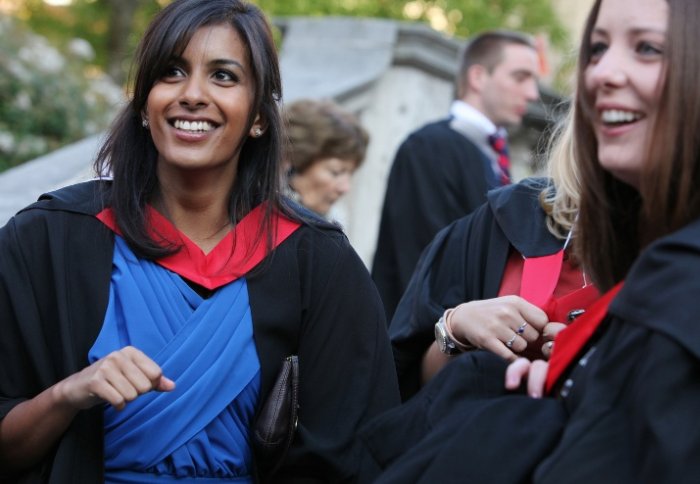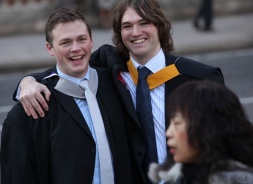Over 2,400 future leaders as Imperial celebrates its graduating students

More than 2,400 Imperial undergraduates gather at the Royal Albert Hall to receive their degrees in Commemoration Day ceremonies
Imperial undergraduates and their families celebrate in the Royal Albert Hall
As more than 2,400 Imperial undergraduates gather at the Royal Albert Hall to receive their degrees in today’s Commemoration Day ceremonies the College’s President & Rector tells them to take London’s Olympic year, showcasing its international leadership in culture and sport, as inspiration for their being the global leaders of the future.
See a stream of tweets and photos from across the day.

Students celebrating
The graduating students are joined by some 7,000 family and friends as the College hosts three ceremonies for the first time, to accommodate demand from guests to be part of the occasion. Alongside academic accomplishments, a number of students will also be recognised for their achievements in other areas of College life. Receiving Student Awards for Outstanding Achievement are Kadhim Shubber from the Department of Physics, Jason Parmar and Marco Couch (both Chemistry), Nicolas Massie (Medicine), and Charlotte Ivison (Life Sciences), who have all been nominated by senior members of college staff for their contribution to student welfare, the College’s outreach work, and charity.
President & Rector, Sir Keith O’Nions, says:
“To graduate in any year is special, but perhaps never more so than in 2012, the year of London’s spectacular Olympic and Paralympic Games. These were global Games in a global city, and at Imperial our great strength is as a truly international institution. I know that today’s graduands will go on to make significant contributions in all their endeavours around the world and join the 160,000 Imperial alumni who have gone on to exciting careers, including in industry, public service, medicine and science.”
More information for graduands and their guests.
College honours
As well as recognising the achievements of this year’s graduates, Imperial also honours others who have made contributions to the College.
Lord Kerr of Kinlochard, former head of the British Diplomatic Service, served Imperial as Chairman of the Court and Council from 2005 to 2011 and helped steer the College through the changes in the Higher Education sector and the wider economy. He was central to a number of Imperial initiatives, including the College’s response to the Browne Review in 2010 on the future of higher education funding and finance. He then worked closely with the Imperial College Union to develop a financial support package to enable the brightest students to study at the College regardless of financial circumstance, and was involved in the decision to purchase the former BBC Woodlands site in 2009, now being redeveloped as the Imperial West campus. In recognition of his work he receives an honorary fellowship.
Alumnus Jonathan Spatz receives an Imperial College Medal for his contribution to the College. He graduated from Imperial with a Masters in Electrical Engineering – Control Systems in 1970, and worked for Imperial Chemical Industries in the UK before moving to the United States. After a period occupying senior positions in Financial Services institutions, he became Chief Executive Officer of steel industry company Shenago, Inc. in 1986. In 1989 he began his association with the Imperial College Foundation - a non-profit corporation based in Georgia, USA, and subsequently became its Vice President in 2000. The Imperial College Foundation’s donations support the mission of the College, advancing training and research in the sciences and their application to medicine and industry.
Rector's Medals
Five members of staff also receive Rector’s Medals at the ceremony. Receiving the Medal for Outstanding Contribution to Teaching Excellence are Professor Alan Spivey (Department of Chemistry) and Dr Emma McCoy (Department of Mathematics). Their medals recognise their innovative approaches to teaching, bringing e-Learning to their departments and encouraging students to teach in schools for degree credit. Professor Alison McGregor (Department of Surgery and Cancer) receives the Medal for Excellence in Pastoral Care, having been described by students during the nomination process as an inspiration for her open, honest approach and her overriding concern for student welfare.
The Medal for Supporting the Student Experience goes to Dr Michael Barrett (Department of Medicine), for driving technological improvements, developing relationships with NHS partners, and supporting students in their elective years. Professor Adrian Sutton (Department of Physics) is unable to be present on the day, but will also receive the Rector’s Medal for Outstanding Contribution to Teaching Excellence, awarded for his work on new postgraduate transferable skills courses and heading up the pilot of the Imperial Horizons scheme.
The Undergraduates’ Commemoration Day is named in honour of a visit to Imperial by King George VI and Queen Elizabeth in 1945, on the centenary of the foundation of the Royal College of Chemistry, Imperial's oldest forerunner.
Article text (excluding photos or graphics) © Imperial College London.
Photos and graphics subject to third party copyright used with permission or © Imperial College London.
Reporter
Anthony Wilkinson
Office of the Provost